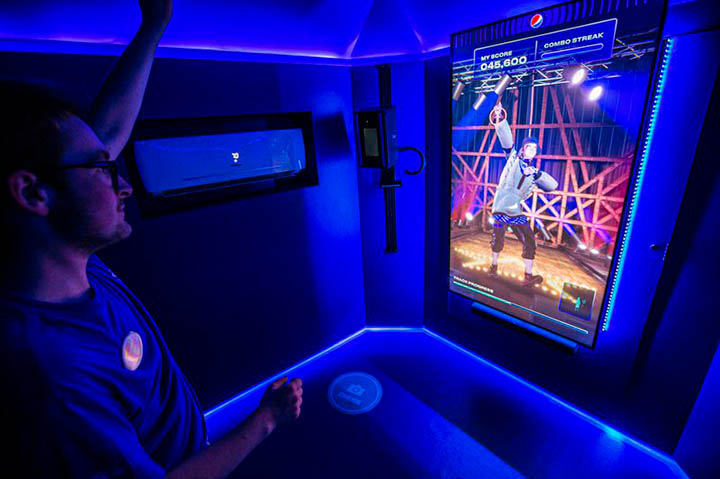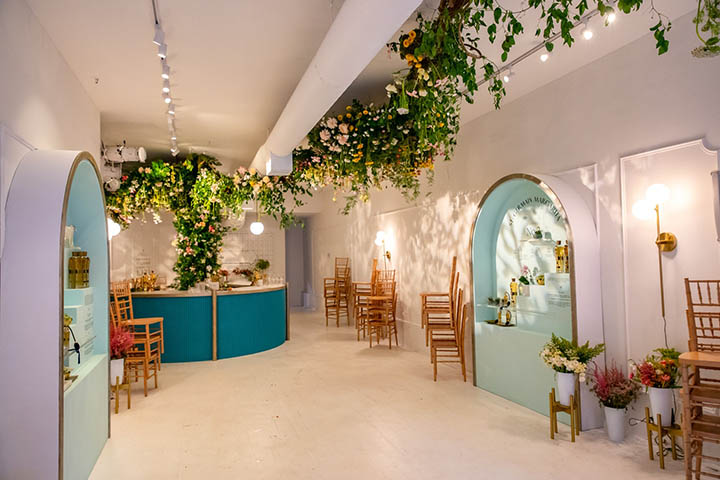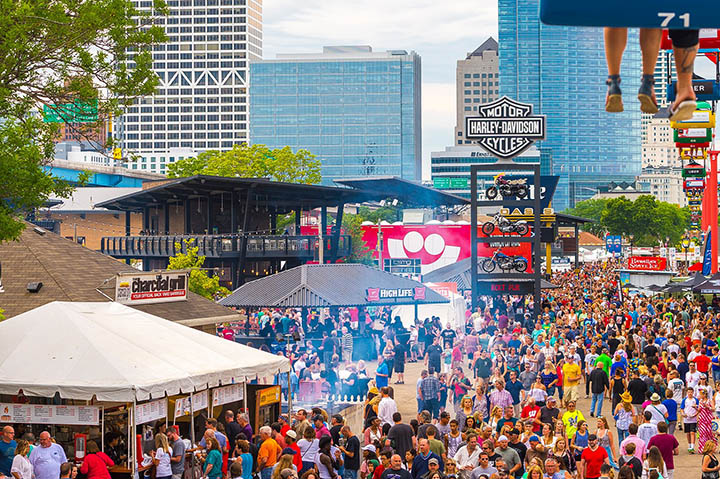Strategy August 23, 2021
Demand Returns for Brand Activations
Meanwhile, marketing professionals in the space are contending with changing COVID policies and inventory shortfalls.
After a challenging 2020, brands again want experiential marketing campaigns to reignite audience engagement, and marketing firms are meeting demand.
Brand activations – a type of experiential marketing in which a target audience is given an interactive experience put on by the brand and often receives a customized take-home item as a souvenir – saw strong growth in the years before COVID. The popular branding strategy took a huge hit last year for obvious reasons, but companies say demand is coming back. A recent survey by media company Event Marketer and experiential marketing firm Mosaic found that more than 80% of brands expect their event and experiential budgets to soon be the same or greater than they were pre-COVID.

The contactless Pepsi Pop Star experience at Hersheypark offers guests the opportunity to record a music video featuring their avatars.
Brand activations range from permanent installations, like the new Oreo Café at the American Dream mall in East Rutherford, NJ, and Pepsi Pop Star, a studio for creating music videos at Hersheypark in Hershey, PA, to temporary experiences like Fleuriste, a two-day Parisian salon-inspired pop-up from French liqueur brand St-Germain that featured a cocktail bar, flower shop and ballet performance space in New York City last month.

The Fleuriste pop-up shop in New York featured cocktails, a flower shop and live ballet performances.
Of course, they look a little different since COVID. In addition to masks, high-touch items are cleaned regularly and guests kept socially distanced. Pepsi Pop Star, for example, is contactless and provides a separate video recording pod for each user and their avatar (a technology that Facebook has also recently launched in an attempt to usher in the next stage of collaboration during remote work).
“It’s comforting for people to see things like this happening again,” says Lucas Guariglia, owner of Rowboat Creative (asi/313715) in Chicago, a company that has extensive experience with brand activations (including Nike shirts at a run in 2018). “But we have to make sure it’s distanced, people aren’t breathing on each other and we’re cautious of high-touch items. They’ve been scaled back a bit.”
Tim Williams, CEO of U.K.-based brand activation agency YR Live, says retail and tech brands are starting to look for ways to re-engage with their audiences and brand experiences are a surefire way to do just that. Right now, his team is traveling across the U.S. offering live printing and embroidery at malls on behalf of the Ralph Lauren brand.
“Things have changed a bit,” says Williams, whose team hosted a live event for Google at the Cannes Film Festival in 2018. “Of course, we operate with masks and follow protocols during installation, during the event and after. We want to keep our team and the public safe. We clean our touchscreens very often and offer guests the chance to use their own device if they aren’t comfortable touching a larger screen. But all in all, it feels like normality is returning.”
Guariglia has seen a pretty steady stream of activation demand, in particular for breweries in Charlotte, NC, as well as the Charlotte Hornets NBA team and the Chicago Fire soccer team. Right now, Rowboat is deep into planning an activation at Summerfest, a major music festival in Milwaukee starting Labor Day weekend. Guariglia and staff will produce custom cut-and-sew hip packs on site, on behalf of their client. But with COVID, things can change very quickly.

Summerfest is one of the country’s largest music festivals, held each year in Milwaukee on the shores of Lake Michigan. It’s slated to take place for nine days next month.
“It’s keeping me up at night,” says Guariglia. “We’re far into it even though we don’t know exactly what’s going to happen. Will attendees need vax cards or negative COVID tests, like Live Nation is doing? We usually plan three to four months out, because of logistics and staffing. At the same time, we have to determine if it’s a good idea to continue with a project when it could ultimately be canceled by restrictions. We’re responsible for our teams and other people out there.”
Live Nation is requiring proof of vaccination or a negative COVID-19 test for entry to any Live Nation owned venue or festival in the U.S. beginning Oct. 4, according to news reports.
Like the Pepsi Pop Star experience, where guests are kept separate for the entirety of the activation, Williams says for the time being he expects extra space and sanitation to be a given moving forward. “People are still uncomfortable in communal spaces, so having more room, giving people a little more comfort at events, is now the norm,” says Williams. “I think that’s here to stay.”
Currently, though, supply chain and staffing issues are putting a damper on the entire industry, including activations. Even if all systems are a go health measures-wise, there’s a constant risk that venues will be short-staffed and inventory won’t be available in time for the event.
“If we get an order for 150,000 T-shirts as a giveaway and we can’t get them, the event doesn’t exist,” says Guariglia. “It’s only getting worse this fall and winter. And logistics is a challenge. Hotels aren’t offering refunds, so if I book five rooms for staff for a few weeks to host an experience and the event doesn’t happen, what do I do with those?”
Despite the headwinds the market – and wider industry – is currently facing, both Guariglia and Williams are optimistic for the longer term as things return to normal. “Live events are key to coaxing consumers out of their homes and back to stores to spend money,” says Williams. “We can help brands re-engage and excite their customers.”
